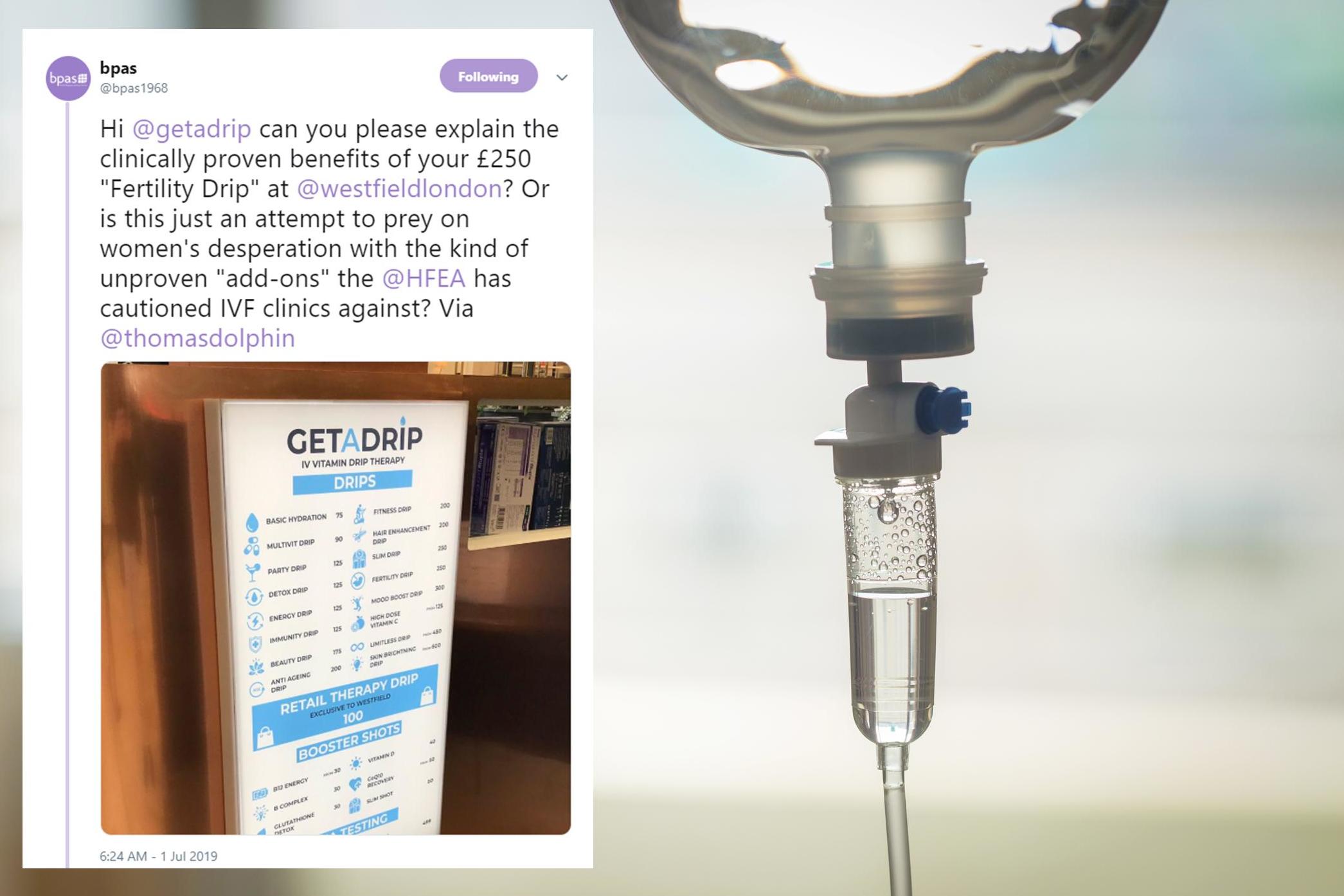Wellness company stops selling £250 ‘fertility drips’ following backlash over lack of scientific evidence
‘We understand that the issue of fertility is much deeper than nutrition’

A wellness company that sold “fertility drips” for £250 in London has removed the treatment from its menu after critics argued there was no scientific evidence it would help women to conceive.
Get a Drip, which has stores in Shoreditch and Westfield, has said it made no claims that the drip would treat or alleviate any medical condition, but that it aimed to boost “overall wellness” and “help support normal fertility”.
However, the drip was widely criticised by doctors and charities, who argued that it was unlikely to benefit fertility and perpetuated a damaging myth that fertility issues can be remedied with quick-fix solutions.
In light of the backlash Richard Chambers, founder of Get a Drip, has confirmed the company has dropped the treatment from its offering with immediate effect.
“While we stand by the ingredients’ benefits, we understand that the issue of fertility is much deeper than nutrition,” he said in a statement.
All the women who celebrated the sisterhood at the Met Gala 2019
Show all 10“As a company, we offer health supplements that act to aid and improve overall wellness. We are deeply sorry for the insensitivity of the fertility drip and apologise wholeheartedly for any upset caused.”
Katherine O’Brien, a spokesperson for the British Pregnancy Advisory Service (BPAS), said that clinically unproven fertility treatments such as Get a Drip’s are “designed to exploit vulnerable women”.
“Women who are struggling to conceive often feel a huge amount of guilt, and NHS-funded fertility treatments are becoming increasingly difficult to access,” she said.
“As a result, women are particularly vulnerable to snake-oil salesmen who seem to promise a quick fix at an extortionate cost.”
O’Brien added that it is not clear how such treatments are regulated, if at all.
“There is no evidence that an IV drip of any combination of vitamins can improve a woman’s fertility,” she continued.
Despite its name, Get a Drip’s promotional material for its fertility drip did not list any benefits for female reproductive health, which O’Brien says “suggests [the company knows] that there are none”. She added that these drips could “cause real damage to women’s emotional wellbeing”.
Tom Dolphin, a consultant anaesthetist, recently shared a photograph of Get a Drip’s store in Westfield on Twitter and criticised the company for “selling intravenous therapies of things that most people can take very easily by mouth”.
Dolphin added that few people are actually vitamin-deficient and would benefit more from dietary improvements as opposed to IV drips. He went on to describe the drips as “pseudoscientific ‘wellness’ profiteering”.
In a tweet to BPAS, a spokesperson for Get a Drip said that its fertility drip included “a range of nutrients such as zinc, B complex, and selenium, that when supported with a healthy, balanced lifestyle, can help support normal fertility”. It added that similar oral supplements are available at Boots.
When asked for scientific evidence suggesting the drip has an impact on a woman’s chances of conceiving, a spokesperson for the company said: “We do not diagnose or treat medical conditions; our products are nutritional supplements which aim to increase overall wellness.”
Treatments still offered by Get a Drip include an “anti-ageing drip”, a “slim drip” and a “mood-boosting drip”, which costs £300.
“IV nutrition therapy is an effective, medically supported treatment to help the body reach optimal nutrition,” said Chambers, who claims that the body doesn’t always absorb essential nutrients from diet alone.
“The products used in Get A Drip clinics are specially formulated at pharmaceutical grade level, quality assured and highly technical,” he added, pointing out that a “thorough medical consultation” is completed before anyone can undergo drip therapy.
Chambers continued: “Every precaution is taken to ensure our customers have a the best experience in a safe environment with medical professionals.”
Subscribe to Independent Premium to bookmark this article
Want to bookmark your favourite articles and stories to read or reference later? Start your Independent Premium subscription today.

Join our commenting forum
Join thought-provoking conversations, follow other Independent readers and see their replies